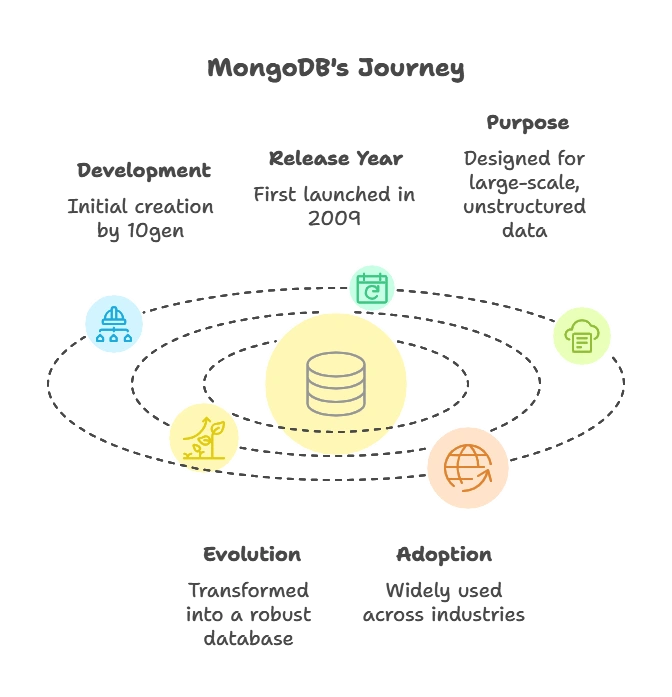Introduction to MongoDB ?
MongoDB is an open-source, document-oriented NoSQL database designed for storing large volumes of data. It uses a flexible, JSON-like format called BSON (Binary JSON) to store data, making it easy to scale and adapt to various application requirements.
Evolution
MongoDB was developed by 10gen, now known as MongoDB Inc., and was first released in 2009. It was created to address the limitations of traditional relational databases, particularly in handling large-scale, unstructured data. Over the years, MongoDB has evolved into a robust, feature-rich database, widely adopted in various industries.

MongoDB Data Model
Databases
MongoDB organizes data into databases. Each database contains collections, which in turn contain documents.
Collections
Collections in MongoDB are analogous to tables in relational databases. However, collections do not enforce a schema, allowing for flexible data models.
Documents
Documents are the basic unit of data in MongoDB. They are stored in BSON format and can contain nested arrays and objects.
{
"_id": "507f1f77bcf86cd799439011",
"name": "John Doe",
"email": "johndoe@example.com",
"age": 29,
"address": {
"street": "123 Main St",
"city": "Anytown",
"state": "CA"
},
"hobbies": ["reading", "traveling"]
}
BSON Format
BSON (Binary JSON) is a binary representation of JSON-like documents. It extends JSON to provide additional data types and efficiency in storage and retrieval.
Security in MongoDB
Authentication
MongoDB supports various authentication mechanisms to ensure only authorized users can access the database.
Authorization
MongoDB uses roles and privileges to control user access to database resources.
Encryption
MongoDB supports data encryption at rest and in transit to protect sensitive data.
MongoDB Use Cases
Real-Time Analytics
MongoDB’s flexibility and performance make it suitable for real-time analytics, enabling quick insights from large datasets.
Content Management Systems
MongoDB’s schema-less design allows for easy content storage and retrieval, making it ideal for content management systems (CMS).
Internet of Things (IoT)
MongoDB can handle large volumes of data from IoT devices, providing efficient storage and real-time data processing capabilities.
MongoDB's flexible, document-oriented approach makes it a powerful tool for modern applications, offering scalability, high performance, and ease of use as well as security measures to protect data. With its wide range of use cases, MongoDB is a versatile database solution, well-suited for the dynamic requirements of today's data-driven world. Happy coding !❤️
